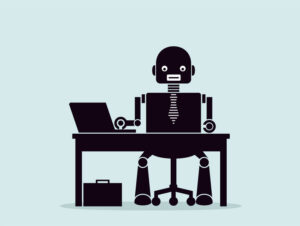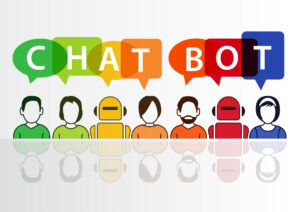 If you’re like me, you may have been wondering about all the commotion surrounding AI and how it will impact your job.
If you’re like me, you may have been wondering about all the commotion surrounding AI and how it will impact your job.
Opinions range from “move along, nothing to see here” to “you’re going to be unemployed and the AI that takes your place is going to pay taxes.” So, I set out to get to the bottom of the issue.
I interviewed a number of industry experts and AI developers to get a solid understanding of what artificial intelligence really is, what it can and can’t do, and what is the near term and far term impact on recruiting.
The very first thing I had to get my head around was the concept of artificial intelligence itself.
Like many nerds of my generation I grew up watching the android Lieutenant Commander Data on Star Trek: The Next Generation. For those of you not familiar with the show, Data is an Android powered by a powerful and complex AI.
AI: Artificial, but not intelligent
A more scientific approach to artificial would be to use what is known as the “Turing test.”
The idea is simple: You have ask a question that the AI or the human answers. If you can’t tell the difference between the human and the AI, then the AI is said to have passed the test.
While some chatbots have fooled 1 in 3 people during five minute controlled tests, I think it is fair to say that no AI to date has passed the Turing test.
Michael Beygelman, CEO of Joberate, said of AI, “it is artificial but it isn’t intelligent.” That isn’t a slight, but an observation. We have yet to create a true AI. However, that is a headline to watch for, because it will be a major tipping point not only for our industry, but for the entire economy.
So, what actually is AI and what can it do? More importantly, why should we care?
Let’s start with this: The tools that are sold under the artificial intelligence umbrella fall into three (3) basic categories:
- Chatbots;
- AI assisted searches; and,
- Automated Assistants.
Chatbots
Chatbots are designed to do several different things. The first and most obvious is that they interact with prospective candidates that wish to apply to your company.
They engage in what is called a natural language interaction. The idea is to have the chatbot ask the questions needed to complete a job application.
 This is a much needed update to our current methods of applying for jobs online. That sounds cool enough, but what got my attention was that according to Gerry Crispin, Co-Founder of CareerXroads, companies that have used AI chatbots get conversion ratios as high as 90 percent.
This is a much needed update to our current methods of applying for jobs online. That sounds cool enough, but what got my attention was that according to Gerry Crispin, Co-Founder of CareerXroads, companies that have used AI chatbots get conversion ratios as high as 90 percent.
The other things that an AI chatbot can do, that isn’t as obvious, is that it can screen candidates in near real time.
Once the application is completed, the AI can engage the candidate and ask if they would like to interview for the position. The chatbot will then present the candidate with questions they can answer with text, or in some cases, even create a video.
The AI will analyze the answers and even evaluate the video. If the prospect passes the qualifying questions, the AI can schedule the interview by asking the candidate to select a time that is available based on the recruiter’s calendar. The other statistic I found interesting was that 70 percent of the candidates who completed the application also completed the AI interview.
I understand that you don’t need more unqualified applicants, but that isn’t the end of what artificial intelligence can do.
AI works best when dealing with hundreds of candidates
As Aaron Matos, CEO of Recruiting.com, explained to me, clients that have deployed his AI “Olivia” have been able to eliminate 70 to 80 percent of unqualified candidates before they even make it to a recruiter.
Artificial intelligence is more than an old school decision tree. It’s able to “learn” and adapt. Based on new information and feedback from recruiters, it’s able to improve its matching and screening. Max Armbruster, CEO of Talkpush, said, “The best value is when you are dealing with hundreds of candidates.”
I have had over 100 people apply to a single job posting before. I know that when I had 25, 30 or 40 or more requisitions, it becomes impossible to review all of the resumes of applicants. No one knows how many great hires are missed because their resume is buried somewhere inside of an ATS.
That leads me to the next thing that artificial intelligence can do for you — it can help eliminate the dreaded resume black hole.
Pim Bemelmans, Director at XORBOT said, “We are working to eliminate the black hole of recruiting and make sure that every candidate that applies at least gets reviewed and gets appropriate feedback.”
Max Armbruster may have said it best when he told me,
The great hope is to have a recruitment experience which is less likely to suffer from human error, confirmation bias, racial bias, and bad habits in general — but breaking through those isn’t intuitive.”
Ironically it may be an AI that brings humanity back to recruiting.
AI assisted searches
The second application for AI is in search. I spoke with Ninh Tran, COO of Hiretual, to learn more about how it works. He told me,
The efficiency of our sourcing AI is about three-quarters of the best sourcer in the world right now. You can improve AI to (make it) better than a human, but it becomes increasingly difficult to get better because there are diminishing returns. The solution is saving people time. It is supposed to make your life easier. “
 At first, I was skeptical about that claim, but then I remembered the 2017 SourceCon sourcing challenge. Brilent’s AI-based talent recruitment software came in 3rd place in the competition. Now, it didn’t conduct outreach to prospects as that was not part of this challenge, but it is an impressive result given the competition it faced.
At first, I was skeptical about that claim, but then I remembered the 2017 SourceCon sourcing challenge. Brilent’s AI-based talent recruitment software came in 3rd place in the competition. Now, it didn’t conduct outreach to prospects as that was not part of this challenge, but it is an impressive result given the competition it faced.
The other interesting thing I discovered was the amount of contact information that these new tools are able to uncover. It is an important step for sourcing technology if we are ever going to break our addiction to LinkedIn’s InMail.
AI or augmented search or whatever you decide to call it is here and it is viable. Based on my conversations, I would say that it is going to be most useful to those recruiting in the IT space, but as more and more digital information becomes available, I can only assume that it will improve its performance in other areas as well.
Automated Assistants
The final application of AI is one that I didn’t consider originally. A recruiting AI can help you automate some of your routine work.
Gerry Crispin shared with me a story about a company that was using an AI assistant. Using the AI, they were able to get the requisition approval process from four (4) days down to 1 minute, 45 seconds.
Scheduling is also something that the AI assistant is able to help with. Setting up phone screens no longer needs to take several emails or involve an episode of phone tag. The AI will allow the candidate to select a time when they are available and schedule themselves for the interview when you are available.
I did not hear of an AI being used for interview feedback or for offer letter generation, but I assume that it is only a matter of time before those functions are augmented with some sort of AI as well. These may seem like small matters, but if you can automate some of these actions and take a few days off the time to fill rate, this becomes a tool worth considering.
So what is the short term impact of artificial intelligence on recruiting?
The answer: AI is a useful tool for companies that receive a large number of applicants and genuinely want to improve the candidate experience.
Yes, AI may bring humanity back to recruiting
The ability to screen hundreds of candidates in minutes is new to the industry. Interaction with an AI has driven conversion rates as high as 90 percent. When a video interview is offered, over 70 percent of people that had completed an application also completed a video interview. The AI was then able to stack rank the applicants for the recruiter to review. Additionally, the AI is available 24/7 to answer questions that the applicant might have.
Ironically, it may be artificial intelligence that brings humanity back into recruiting and makes the resume “black hole” a thing of the past.
For those of you who struggle to find niche talent, an AI augmented search can be a good tool to use. At present, it doesn’t help you with outreach so you really need to punch up your messaging before you will see the results of better searches. That said, there is an advantage if you have the ability to uncover talent that your competition might not be able to find.
An AI assistant will be valuable to those companies that have established processes and do high volume recruitment. The value is that it can help you take days off your time to fill rate once someone is already in the funnel.
 The value of cutting three days off time to fill is relatively low for one req, but what if you could take three days of the time to fill for 1,000 reqs?
The value of cutting three days off time to fill is relatively low for one req, but what if you could take three days of the time to fill for 1,000 reqs?
What would that be worth?
Something recruiters need to pay attention to
Something else to consider: Short term, you aren’t out of a job unless you work in coordination. The tools are really designed at this point the help us get more hires and better hires in less time.
That is music to the ears of any leader in Talent Acquisition. However the longer term prospects are more difficult to judge, and I had a wide variety of answers when I asked about the long term impact of AI on recruiting.
So in the long term, are we out of a job or is there really nothing to worry about?
Here’s what Gerry Crispin said:
Long term, 80 percent of recruiters will not be needed, but 20 percent will elevate their game to decision and strategy and the remainder will go do something else.”
I don’t know how long long term is, but when I hear someone like Gerry make a statement like that, I’m definitely going to pay attention. It’s safe to say that this isn’t like some of the other recruiting fads that have come and gone.
This is something we are ALL going to have to pay close attention to.
Here’s one last bit of advice on the subject from Ninh Tran, COO of Hiretual:
It is going to be humans partnering with technology to make things simpler and faster. If you don’t embrace it that is fine, but if there is a person that wants to keep their competitive advantage for years to come, becoming a new technology adaptor is the way to go.”
Authors
Mike Wolford
As the Talent Intelligence Titan with over 15 years of progressive experience, I've dedicated my career to revolutionizing the talent acquisition landscape. My journey, marked by leadership roles at esteemed organizations like Claro Analytics and Twitter, has equipped me with a deep understanding of recruiting, sourcing, and analytics. I've seamlessly integrated advanced AI technologies into talent acquisition, positioning myself at the vanguard of recruitment innovation.
Recruit Smarter
Weekly news and industry insights delivered straight to your inbox.





